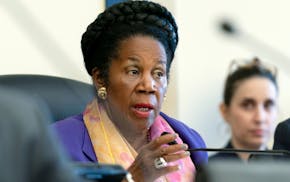LAGRANGE, GA. – Lonnie Hollis has been a member of the Troup County election board in West Georgia since 2013. A Democrat and one of two Black women on the board, she has advocated for Sunday voting, helped voters on Election Days and pushed for a new precinct location at a Black church in a nearby town.
But this year, Hollis will be removed from the board, the result of a local election law signed by Gov. Brian Kemp, a Republican. Previously, election board members were selected by both political parties, county commissioners and the three biggest municipalities in Troup County. Now the GOP-controlled county commission has the sole authority to restructure the board and appoint all the new members.
"I speak out, and I know the laws," Hollis said in an interview. "The bottom line is, they don't like people that have some type of intelligence and know what they're doing, because they know they can't influence them."
Hollis is not alone. Across Georgia, members of at least 10 county election boards have been removed, had their position eliminated or are likely to be kicked off through local ordinances or new laws passed by the state Legislature. At least five are people of color, and most are Democrats — though some are Republicans — and they will most likely all be replaced by Republicans.
Hollis and local officials like her have been some of the earliest casualties as Republican-led legislatures mount an expansive takeover of election administration in a raft of new voting bills this year.
GOP lawmakers have also stripped secretaries of state of their power, asserted more control over state election boards, made it easier to overturn election results, and pursued several partisan audits and inspections of 2020 results.
Republican state lawmakers have introduced at least 216 bills in 41 states to give legislatures more power over elections officials, according to the States United Democracy Center, a new bipartisan organization that aims to protect democratic norms. Of those, 24 have been enacted into law across 14 states.
GOP lawmakers in Georgia say the new measures are meant to improve the performance of local boards and reduce the influence of the political parties. But the laws allow Republicans to remove local officials they do not like, and because several of them have been Black Democrats, voting rights groups fear that these are further attempts to disenfranchise voters of color.
The maneuvers risk eroding some of the core checks that stood as a bulwark against former President Donald Trump as he sought to subvert the 2020 election results. Had these bills been in place during the aftermath of the election, Democrats say, they would have significantly added to the turmoil Trump and his allies wrought by trying to overturn the outcome. They worry that proponents of Trump's conspiracy theories will soon have much greater control over the levers of the U.S. elections system.
"It's a thinly veiled attempt to wrest control from officials who oversaw one of the most secure elections in our history and put it in the hands of bad actors," said Jena Griswold, chair of the Democratic Association of Secretaries of State and the current Colorado secretary of state. "The risk is the destruction of democracy."
Officials like Hollis are responsible for decisions like selecting drop box and precinct locations, sending out voter notices, establishing early voting hours and certifying elections. But the new laws are targeting high-level state officials as well, in particular secretaries of state — both Republican and Democratic — who stood up to Trump and his allies last year.
Republicans in Arizona have introduced a bill that would largely strip Katie Hobbs, the Democratic secretary of state, of her authority over election lawsuits, and then expire when she leaves office.
Under Georgia's new voting law, Republicans significantly weakened the secretary of state's office after Brad Raffensperger, a Republican who is the current secretary, rebuffed Trump's demands to "find" votes.
Kansas Republicans in May overrode a veto from Gov. Laura Kelly, a Democrat, to enact laws stripping the governor of the power to modify election laws and prohibiting the secretary of state, a Republican who repeatedly vouched for the security of voting by mail, from settling election-related lawsuits without the Legislature's consent.
And more Republicans who cling to Trump's election lies are running for secretary of state, putting a critical office within reach of conspiracy theorists. In Georgia, Rep. Jody Hice, a Republican who voted against certifying President Joe Biden's victory, is running against Raffensperger. Republican candidates with similar views are running for secretary of state in Nevada, Arizona and Michigan.
"In virtually every state, every election administrator is going to feel like they're under the magnifying glass," said Victoria Bassetti, a senior adviser to the States United Democracy Center.

JD Vance, an unlikely friendship and why it ended

Lewis Lapham, editor who revived Harper's magazine, dies at 89

Body of missing Minnesota hiker recovered in Beartooth Mountains of Montana
Mike Lindell and the other voting machine conspiracy theorists are still at it
